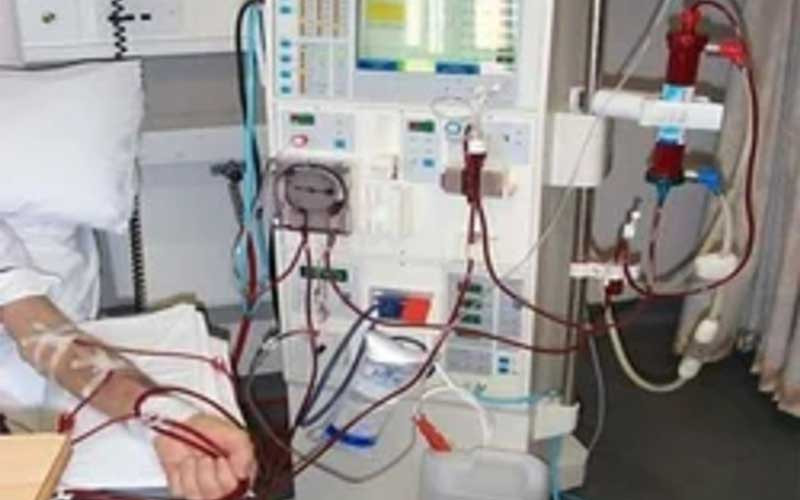
FOR 24 years Vasco Mukunangana (47) has endured the pain and frustration of accessing treatment for his kidney ailment.
With kidney treatment services at government health centres almost non-existent, private clinics and hospitals offering the services are beyond the reach of many like Mukunangana.
Despite improvements in the availability of treatment services for kidney patients on dialysis, most of the dialysis units are mainly in Harare, the capital city, and offer little relief to patients living in remote areas who have to travel long distances to access dialysis treatment.
Dialysis involves the removal of waste products and excess fluid from the blood when the kidneys are not working properly. It often involves diverting blood to a machine to be cleaned. Normally, the kidneys filter the blood, removing harmful waste products and excess fluid and turning these into urine to be passed out of the body.
There are two forms of dialysis, haemodialysis and peritoneal dialysis. Both types of dialysis can make a person feel exhausted.
Research has also revealed that haemodialysis may cause itchy skin and muscle cramps, while peritoneal dialysis can also put one at risk of developing peritonitis, an infection of the thin membrane that surrounds the abdomen.
“We would appreciate it if there are more government dialysis centres and more dialysis machines at rural centres to cater for those patients who do not have medical aid and are less fortunate,” Mukunangana said.
“It should be a choice for someone to opt to go to a private dialysis centre or and not to be forced to do so because one cannot find a slot at a public health institution. The cheapest private dialysis centre is charging US$100. That is the Red Cross and Mbuya Dorcas. Others are charging between US$130 and US$200.”
- Health talk: Covid-19: Remain vigilant as Omicron roams
- Health talk: Covid-19: Remain vigilant as Omicron roams
- Health Talk: Your health matters in this election period
- Zim youths in hypertension scare
Keep Reading
A kidney patient requires as many as three sessions per day for some, meaning that people can die while on dialysis if they do not have a kidney transplant, particularly older people and those with other health problems.
Someone who start dialysis in their late 20s can expect to live for up to 20 years or longer, but adults who are over 75 years may only survive for two to three years.
Mukunangana said dialysis treatment at the country’s health institutions, however, excluded iron sucrose and erythropoietin injections administered during dialysis and are mandatory for patients.
Erythropoietin costs US$14 per 4 000 international units (IU), while iron sucrose costs US$6 per injection.
“Others are on 10 000 IU so they need about US$28 for that single dose of the injection,” Mukunangana said.
In 2018, government pegged dialysis fees at US$40 at public institutions to minimise the treatment costs.
But where government is offering the cheap service like at the Premier Service Medical Investments (PSMI) dialysis centres, there are usually no dialysis consumables and patients are being asked to bring them.
“These consumables are not available in pharmacies so one has one or two options, to get them from South Africa or get them from runners who charge double the price.
“One would end up spending about US$70 to buy consumables for a single session and by right, one needs at least two or three sessions per week. Some patients are skipping sessions as a result and it's very dangerous and risky,” he said.
Mukunangana said government hospitals had no machines suitable for patients living with certain infections like HIV.
“We would appreciate it if there are more government dialysis centres and more dialysis machines at these centres to cater for those patients who do not have medical aid and are less fortunate.
“It should be a choice for someone to opt to go to a private dialysis centre not to be forced to do so because one cannot find a slot at a public health institution,” he said.
Complicating kidney patients’ plight is that medical aid schemes are no longer paying for dialysis in full, especially those earning in the local currency.
Nephrologist Rumbidzai Dahwa expressed concern over patients seeking treatment late.
“One of our biggest challenges is that our patients present late when they have advanced kidney disease resulting in them struggling to afford the required treatment,” she said.
Currently, Parirenyatwa Group of Hospitals, B Braun, Parkview, Dandaro, St Annes, Harare Haemodialysis, CBD dialysis and the Red Cross are offering the services.
Other dialysis centres include Sally Mugabe Central Hospital, Mbuya Dorcas Hospital, Montague Dialysis Centre, Marondera Provincial Hospital, Mpilo Hospital, Murambi Clinic (Medwise) and PSMI has dialysis centres in Mutare and Bulawayo.
However, most of them have at most four machines.
According to authorities at Parirenyatwa, the government hospital attends to nearly 50 patients everyday for dialysis sessions.
The Health and Child Care ministry said Zimbabwe recorded 1 000 cases of kidney failure every year with only 700 accessing dialysis while the rest could not afford the lifesaving services.
“Kidney disease is also a silent killer, which affects the quality of life. About half of people who have diabetes develop kidney damage hence it is important to keep control of blood sugar level,” the ministry said.
According to the Journal of The Egyptian Society of Nephrology and Transplantation in Zimbabwe, the published prevalence and deaths from chronic kidney disease in 2017 were 944 836 and 1740, respectively.
Chronic kidney failure cases are rising in Zimbabwe due to hypertension, diabetes, and ageing population (about 1 000 cases per million annually).
This has resulted in a high requirement for dialysis therapy in public and commercial dialysis facilities across the nation.







